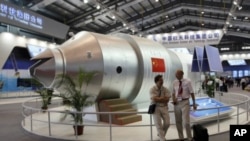China is expected to launch its Tiangong 1 space laboratory in the coming days. A country that only eight years ago put its first taikonaut (astronaut) into orbit could, in eight more years, be the only country to possess a permanently-crewed space station.
Chinese media report that the Tiangong 1, or “Heavenly Palace”, is being readied for flight at the Jiuquan launch facility in Inner Mongolia.
The module represents the first element of China’s plan to develop a manned space station, which Beijing hopes will be fully operational by 2020.
Professor Kwing-Lam Chan of Hong Kong University of Science and Technology is involved in analysis of China’s lunar program. He explains the objective of this first Tiangong mission:
“It’s a lab for testing the connection between spacecraft: Shenzhou 8 will be sent [up] probably this year, and will be connected to Tiangong 1 for testing, but will not carry people,” he said.
State media report that China’s space program aims to enhance the country’s “progress, power and prestige”.
Under military authority, it has advanced rapidly despite European Union and U.S. embargoes on trading in defense-related technologies with China.
The Shenzhou spacecraft emerged from Russian Soyuz technology in the late 1990s. A first manned space mission for China followed in 2003, making a national hero of the taikonaut Colonel Yang Liwei.
Professor K.L. Yung of Hong Kong Polytechnic University is helping develop equipment that China will use on the Moon next year.
He suggests that while China’s space program is no more advanced those of other space-faring nations, a team of elite engineers and scientists is making incremental and cost-effective progress.
“The main reason is obviously salaries in China are not that high. The other reason is, they are developing a lot of their own components because of the high-tech embargo; it actually helps them.”
With the International Space Station, funded by Russia, the United States, Canada, Japan and the EU, slated for retirement in 2020, Yung points out that China could soon emerge as the only nation with a permanent, manned space platform.
The potential for such a strategic advantage in space, aligned with China’s ballooning defense budget, is causing international concern.
Last week, the U.S. Defense Department published its annual report on China’s military capabilities. The report concluded that Beijing is developing “extensive space warfare technologies".
The report also found little evidence that “China’s leaders have fully thought through the global effects of employment of these strategic capabilities”.
Although Beijing insists it “opposes the weaponization of space”, India, Japan and Korea continue to play catch up with their own indigenous space programs.
However, Chan is convinced China is receptive to cooperation, on its terms:
“I am very impressed by the quality of the people on the space enterprise in China and I believe they want to collaborate, on equal grounds.”
Tiangong 1 is at least the fourth space launch China has conducted since mid-August. However, the ambitious pace of the launch schedule is now under scrutiny after August 18th, when an experimental orbiter launched from Jiuquan failed to enter orbit when the rocket carrying it malfunctioned.








